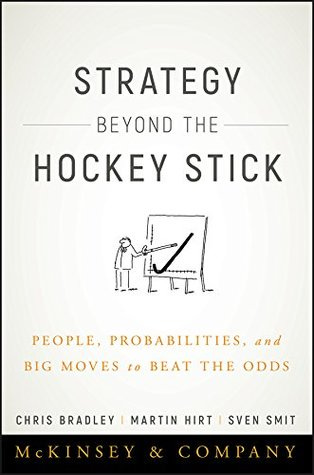Book Review 5/5
Pedro Pinto's Reviews > Strategy Beyond the Hockey Stick: People, Probabilities, and Big Moves to Beat the Odds
Strategy beyond the Hockey Stick was a really pleasant surprise. Was expecting a book with some level of quality about strategy, coming from Mckinsey and Company, but got much, much more in this relative concise book (235 pages) that provides a clear framework on the key pillars that make a difference on your company performance and how a sound strategy process should be deployed.
It also presents the 10 key levers. divided in 3 broad categories, that one should be aware if he wants to make his company progress on the power curve distribution of value generation.
Consequently, this is a must-read book for every manager, whatever the ranking you currently have!
Unbundling the aforementioned, below you can find my insights divided in 2 key topics:
a) Assessment of your current strategic process, that leads into the following conclusions (any similarity with your reality is not a coincidence):
1- A cumbersome process that ends in a minimum 150 pages power point presentation that does not add much to the organization and business discussion.
2- A document / process that is not used to openly discuss the current business environment and to make key decisions, but to support and defend the current "status-quo" or the special project of a business unit, where every manager tries to maximize their own utility, and not a process to optimize the utility of the overall company. Each department makes a 20/30-minute presentation where there is no open discussion, but an exposure of what a division/area leader wants to share with the others (hockey sticks are the norm).
Subscribe now
3- A 150 page is produced that does not take into consideration the outside view, i.e. what are the macro-trends, what competition is doing (game theory), a strong PESTEL analysis is not done, and different scenarios are presented and is completely skewed to an "Inside View" with lot of details, but low value-added to the discussion.
4- Opaque document with no clear definition of the 3/5 big moves a company should pursue to achieve outstanding results, but just a maintenance of the status-quo and hoping that the macro environment tails the organization to a better performance vs. last year.
5- Non-value-added process to the organization, a missed opportunity with huge opportunity costs associated, with several Hockey Sticks where after an initial investment period the results will increase almost exponentially (unfortunately when you do a follow up of such plans, we usually see a graveyard of hairy-back outcomes),
6- Strongly biased process where you can usually find: (i) Halo Effect, (ii) Anchoring, (iii) Confirmation Bias, (iv) Champion Bias, and (v) Loss Aversion.
7- A document that proposes that the company will do a lot better next year, continuing to the same of this year.
8- A document that does not recognizes uncertainty in the market (ranges of predictive values vs. 1 number forecast), lacks a proper baseline to start the assessment, there are errors in performance attribution (good performance is always attributed to good management and bad performances to market conditions), amongst others.
Share
b) How can you change that reality?
1- Define the correct yardstick to manage your company performance. Choose the Economic Profit indicator while assessing your business. With that you ensure that you are properly measuring all the costs in your company, including the Cost of Capital, and with that you are generating value to your shareholders and the overall company. How many companies just measure their performance vs. EBIT or other financial performance indicator that just has an internal perspective into consideration.
2- Using this metric, we can clearly see that value creation distribution across industries is a power curve, that follows power laws principles, i.e. the tails of the value distribution curve raise or fall exponentially. You can see that behavior in several other data sets, like in economics, demographic, and nature. The companies on the top-quintile of the distribution capture >90% of the value created, thus you should strive to be there.
3- You should be cognizant that 50% of your company positioning on the power curve comes from your industry, thus it would be easier to be an average company in a great industry that an exceptional company in an average industry. However, you can find companies from several industry in the top 10% of the distribution.
Leave a comment
4- In order to move on the Value Power curve, you need to: (i) grow your business top-line and (ii) improve the ROIC. Only by playing with these 2 factors you will be able to improve your Economic Profit significantly.
5- You should be able to provide and determine probabilities to each strategic initiatives recognizing that some have a success probability of 90% but with limited and reasonable improvements on your ROIC and Top Line and others that have a lower probability of success (lets say 50%) but with huge payoffs. You should then measure and pay your managers accordingly with this probability framework and not treat all challenges the same way.
6- There are 3 key categories that make the difference in the Value Power curve distribution and should be addressed in your strategic process that are: Endowment (what you start with), Trends (what are the winds in your industry) and Moves (what will you do).
7- There are 10 key levers you can use to move along the value power curve distribution, that can be allocated as follows within the 3 categories:
Endowment: (i) Size of your company in terms of Total Revenue- the larger the better; (ii) Debt Level - the less debt you have the better you are prepared to seize the opportunities, (iii) Past Investment on R&D - you need to be on the top half of your industry in the ration R&D investment to Sales.
Trends: (i) Industry Trend - what is your industry average economic profit; (ii) Geographical Trend - to be present in key to growth geographical markets in terms of nominal GDP growth.
Moves: (i) Programmatic M&A - steady stream of deals to add value (investments and divestures); (ii) Dynamic Allocation of resources - ability to re-allocate resources within Business Units, (iii)Strong Capital Expenditures - to be above significantly above the industry average; (iv)Productivity Programs - reduce overheads and or improve labor productivity; (v)Improvements on differentiation - Business model innovation and pricing power.
8- Promote 8 key shifts in your strategic process: (i) from Annual Planning to Strategy as journey, (ii) from getting to a Yes to debating real alternatives, (iii) from peanut butter resource allocation to resource allocation to your 3/5 priorities, (iv) from approving budgets to making big moves; (v) from budget inertia to liquid resources; (vi) from sandbagging to open risk portfolios; (vii) from you are your numbers to holistic perspective on performance, (viii) from long-range planning to forcing the first step.
Subscribe now
Hopefully, you can now understand my strong recommendation and rating of this insightful book.
from Risk Premium https://ift.tt/32Rx0hm
via
IFTTT

